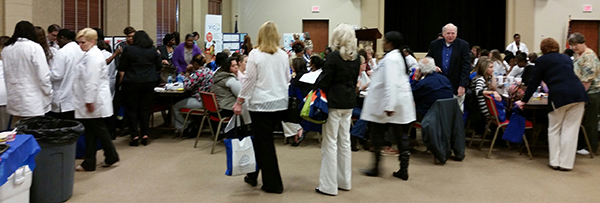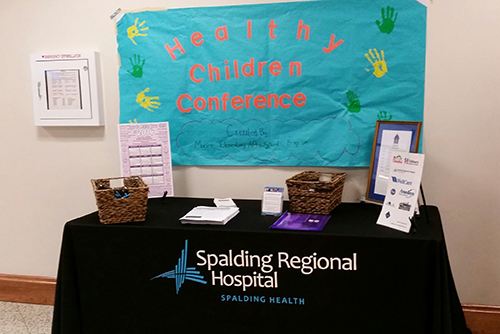It Takes a Village to Raise Healthy Birthweight Rates
Print This Post
BY DIANA ST. LIFER
When it comes to raising a community of healthy children, Spalding County Collaborative Authority for Families and Children understands that it takes a village. Indicators of child well-being are seldom addressed in a vacuum. Tackling a single challenge, such as low birthweight, requires an understanding of other equally challenging issues.
The Collaborative brought together a village of experts at the University of Georgia’s Griffin campus in April 2014 for a free Healthy Children Conference and Expo, which attracted nearly 150 people eager to learn more about child health and well-being.
The daylong conference featured healthcare, education, and child-advocacy professionals, who spoke on a variety of topics including:
- low birthweight and premature babies;
- infant and child development;
- family nutrition;
- literacy;
- parenting skills;
- child abuse prevention;
- childcare providers; and
- pediatric health topics, including audiology, asthma, and immunizations.

“It was amazing,” said Lisa Smith, a resident of Griffin and mother of two. “I learned so much from the speakers. I wish more moms would have attended.”
Kim Stephens, chair of the Spalding Collaborative’s Healthy Children Strategy Team, located at Spalding Regional Hospital, called the conference a huge success, attracting nearly double their goal. “We were shocked we had such a great turnout,” she said. “We were pleasantly surprised.”
The conference, co-sponsored by Spalding Regional Health and Children’s Healthcare of Atlanta and other partner organizations, included vendor exhibits, a free lunch, and a keynote about treatments for children diagnosed with ADHD and other behavior disorders.
Smith learned about the conference through Spalding’s Healthy Connections Group, in which she participated for a year during her second pregnancy. She said the conference provided a wealth of important information that all women need to know. “How you take care of yourself when you are pregnant affects your child,” she said.
Molli Pruitt of the Spalding County Health Department runs the Healthy Connections Group and was instrumental in organizing the conference. “It was an opportunity for us to highlight ways to decrease low-birthweight babies in the context of other important messages, such as understanding developmental milestones and child abuse prevention,” she said. “We have one of the higher child abuse rates in Spalding. Based upon what I’m seeing in regard to the poverty level, I cannot help but think that a lot of these babies are experiencing chronic stress in utero. The moms are chronically stressed—and the babies are too.”
Diana St. Lifer is a professional writer with more than 25 years’ experience. She holds a bachelor’s degree in communications, a post-B.A. certificate in child advocacy, and is a certified professional life coach who specializes in teen and adolescent issues.
The Spalding County Collaborative Authority for Families and Children is adamant about changing the conditions for children and who live there—and decreasing the number of low-birthweight babies is a priority.
Read “Connecting Moms-to-Be with Healthy Lifestyles in Spalding County.”
Low birthweight, childhood obesity, and a literacy gap are serious threats to the well-being of Georgia’s families and children. Recognizing the impact these pressing issues have on the state’s health, safety, and ability to prosper, Georgia Family Connection Partnership has launched three initiatives dedicated to developing and implementing strategies that address these key indicators.
